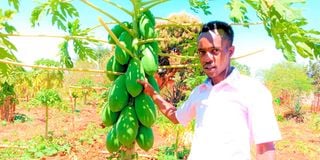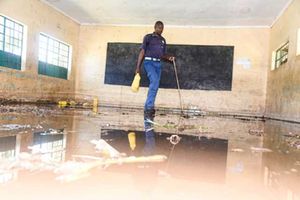Stephen Jeremiah, the young Makueni farmer and his pawpaws

Stephen Jeremiah in his pawpaw orchard in Kalima village on August 20.
Driving from Emali in the Wote direction on an earth road passing through Kwakakulu, Tutini, Masumba, Kikumini and Kalima villages, one crosses several dry seasonal rivers.
A visitor would be forgiven for thinking the river beds are actually roads as there is a lot of sand on the surface.
The area is dry but some agricultural activities are taking place here, including growing of fruits.
Local farmers have devised ways of getting water from the dry river beds.
One of them is Stephen Jeremiah, 27, who grows pawpaws.
The farmers dig rectangular holes in the river beds to get water for their crops and domestic use. Jeremiah’s farm is lush. He irrigates the land with water sourced from the river bed and a nearby swamp. A petrol generator pumps water to his farm.
“I ventured into papaya farming after graduating with a bachelor’s degree in project management at Jomo Kenyatta University of Agriculture Technology four years ago. I also have a diploma in agribusiness,” he says.
Jeremiah had a capital of Sh100,000 when he began growing the fruits in Kalima village, Matiliku sub-county.
“My first seeds were local but I later transitioned to hybrid certified seeds. With time, I began using imported seeds,” he says.
The young farmer also propagates seeds for sale. He grows several varieties of pawpaw, including Calina IPB9 F1, Malkia F1, Red Lady F1, Royale F1, Solo Sunrise and Red Royale.
“I have 1,500 stems of papaya. We also produce seedlings, each going for Sh100. Every pawpaw tree gives two kilos of fruit a week. A big fruit like that of Malkia type can even be three kilogrammes,” Jeremiah says.
Before planting, the farmer prepares land well and makes holes of two cubic feet. He adds manure when refilling the holes.
“The spacing from hole to hole is two metres,” he says.

Jeremiah tends to his seedlings in the nursery. He has about 100,000 pawpaw seedlings.
On the day the Seeds of Gold team visited Jeremiah’s farm, he had sold 1,200 pawpaw seedlings to a client in Kitengela, near Nairobi.
“There are more than 100,000 seedlings in the nursery,” the farmer says.
Jeremiah applies farmyard manure only during planting. Spraying, watering and weeding are some of the management practices carried out on the farm.
The papaya journey has had some challenges too.
Pests and diseases ravaged his crop at some point. Birds are the greatest menace.
The high cost of fuel, herbicides and pesticides also eats into his profits.
“In addition, some customers do not usually pay for the seedlings after delivery,” he says.
Sowing to transplanting the seedlings into polythene paper takes about three months.
Later, they are planted in the open field. In hot areas, the stems take six months to begin producing fruits and seven in cold places, Jeremiah says.
“A discount is given to anyone buying the fruits and seedlings in bulk,” says the young farmer, who gets most of his clients through his Facebook page – Man Stevoh Nurseries.





